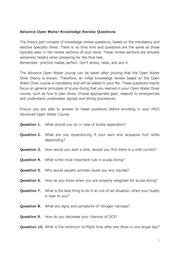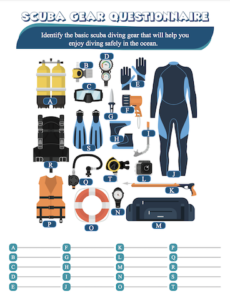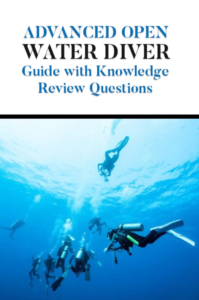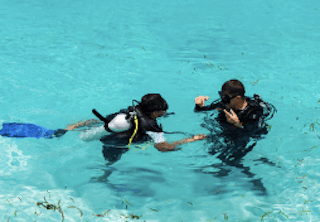Padi Advanced Open Water Knowledge Review Answers Pdf
Final Updated on April 16, 2022 by
PADI Avant-garde Open up Water Diver Course Outline
The PADI Avant-garde Open up Water grade is the next stride for nearly defined who are looking to broaden their diving skills and experience. The class includes a multifariousness of adventures such as deep dives, boat diver, underwater naturalist and other gamble dives that require more than skill level than an introductory dive would demand.
Participants volition also learn how to program your own Adventure Dive itinerary while learning most gamble management in recreational scuba diving and trek planning techniques.
In addition, fifteen elective take chances dives tin can exist called from either shore or gunkhole options which include Deep Dives, Underwater Naturalistship (only available on courses at certain locations) Boat Diver and many others! All participants must have completed the PADI Open up Water Diving Certificate or qualifying certification from another system with a comparable skill level.
If you are looking for downloadable practise cognition review questions for the PADI Advanced Open up Water course, they are bachelor here:
64 Advanced Open Water Course Questions
-
We include 64 Advanced Open up Water Form do questions to help you with your knowledge reviews and include specific take a chance dive questions.

Check our Open up Water Diver Action Sheets for Scuba Gear, Common Words & Diving Manus Symbols.
OWD Scuba Diving Activeness Sheets
-
Open up H2o Diver Activity Sheets for Scuba Gear, Mutual Words & Diving Hand Symbols.

- 7 pages
If you are looking for 55 PADI Open Water Diver Final Exam Practise Questions, and then read this article instead!
19 Practise Questions & Answers
Hither are some practice questions and answers to aid you forth. There are more nearly specific take a chance dives in our downloadable Q&A booklet.
Knowledge Quick Review
Ensure you are able to answer to these questions before enrolling in your PADI Advanced Open Water Course
Question 1. What should you lot do in case of buddy separation?
Question 2. What are y'all experiencing if your ears and airspaces hurt while descending?
Question 3. How would you start a swoop, should you notice in that location is a mild electric current?
Question 4. What is the nigh important dominion in scuba diving?
Question 5. Why would aquatic animals crusade you any injuries?
Question 6. How exercise you know when y'all are properly weighted for scuba diving?
Question 7. What is the best affair to do in an out-of-air situation, when your buddy is near to you?
Question 8. What are signs and symptoms of nitrogen narcosis?
Question 9. How exercise you lot decrease your chances of DCS?
Question 10. What is the minimum no-flight time later two dives in one single day?
Deep Adventure Dives
Question 11. What depth defines a deep dive?
Question 12. What v pieces of scuba equipment are recommended for deep dives?
Question thirteen. What are the right ascension and descent procedures in a deep dive without visual references?
Gas Narcosis
Question 14. List some mutual nitrogen narcosis symptoms.
Question 15. How tin can you help a buddy with visible signs of narcosis?
Question sixteen. Is nitrogen narcosis a permanent or temporary situation?
Decompression Sickness
Question 17. What is decompression sickness (DCS)?
Question 18. What are some common DSC signs and symptoms?
Question xix. What is the most important form of action in case of suspect DCS?
Answers
Knowledge Quick Review
Reply 1. Await for no longer than ane minute, then head to the surface.
Respond 2. Yous are experiencing a squeeze. You demand to equalize your air spaces.
Answer iii. Start your dive confronting the electric current, and render helped by it.
Answer four. Never concord your breath.
Answer five. Aquatic animals attack only when they feel threatened.
Answer 6. You are properly weighted for scuba diving when, at the surface and with an empty BCD, y'all float at the level of your eyes holding a deep breath. As soon as yous exhale, y'all will slowly start to sink.
Answer 7. If your buddy is close, simply signal that you are out of air and switch to your buddy's alternate air source.
Answer 8. A diver experiencing nitrogen narcosis volition act heedlessly at depth. They volition not respond to instructions and human action without any consideration for their or other divers' safe.
Answer 9. Reduce your DCS chances by avoiding diving too deep, too close to your computer's limits, going over no-deco time and by always doing your safety terminate. Too, avoid diving when dehydrated, sick, out of shape and in strenuous conditions.
Respond 10. After 2 dives in i unmarried day, your minimum recommended no flight fourth dimension is 18 hours.
Deep Risk Dives
Answer eleven. Any dive deeper than xviii meters – 60 feet, but still within the xl meters – 120 feet – limit for recreational diving, is a deep swoop.
Answer 12. Yous should consider having a reference line for your descent and ascent, an additional tank at iii meters for your safety end, appropriate thermic protection, additional weights, swoop lights, and of form emergency oxygen given the highest chances of DCS.
Answer thirteen. Always descend and ascend anxiety downward, maintain your position to avert disorientation, and continue the 5 meters level for the 3 minutes safety stop at the height of your heart and lungs.
Gas Narcosis
Answer xiv. A diver experiencing nitrogen narcosis volition show inappropriate and foolish behaviour, slow thinking and reaction response, semi-consciousness, inability to follow instructions or to understand signals, and will virtually likely non remember whatever of this after the dive.
Reply 15. Proceed your buddy safe, if they do not respond to your instructions simply take them to shallower depth where the effects of narcosis will vanish, and stick to that maximum depth for the residue of the swoop.
Answer sixteen. Narcosis is a temporary state of affairs that happens at a specific depth in that specific moment in time. It is nothing life-threatening provided that we react appropriately and timely to it.
Decompression Sickness
Answer 17. DCS or Decompression Sickness, is a condition that results from rapid ascents or excessive build-up of nitrogen in our claret stream. Bubbles will form in our tissues causing hurting, numbness, cramps, and even paralysis and death.
Answer xviii. Symptoms of DCS include hurting, numbness or tingling, unusual fatigue,
skin itch, dizziness and vertigo. Its signs include the diver favouring one arm or leg, paralysis, unconsciousness, staggering, collapse, coughing and blotchy skin.
Answer nineteen. If nosotros doubtable DCS, it is extremely important to have a prompt reaction: administer 100% oxygen to the diver and contact the nearest emergency medical facility. Do non attempt in-water recompression.
We take recently produced a guide helping you excel in your Avant-garde Open H2o Diver course.
Advanced Open H2o Guide
-

Advanced Open Water Guide with 100 Knowledge Review Questions.
This Advanced Open up H2o Diver Guide will help you prepare for your terminal exam and includes things to know before you take the test, tips from an experienced instructor, tricks for taking the examination, and 100 practice cognition review questions across the range of specialty areas.
Summary

Article Name
Ace Your Advanced Open Water Examination At present: 19 Questions
Clarification
The PADI Advanced Open H2o Diver last test includes some noesis questions, and we have included xix practise questions (with their answers) to aid you study. You lot can print these Q&Equally to assistance you become a meliorate mark in your course.
Author
Diver Dan
Publisher
The Best Scuba Diving Gear
Publisher Logo
![]()
starrtheannigully.blogspot.com
Source: https://thebestscubadivinggear.com/padi-open-water-advanced-diver-final-exam-questions-answers/
0 Response to "Padi Advanced Open Water Knowledge Review Answers Pdf"
Post a Comment